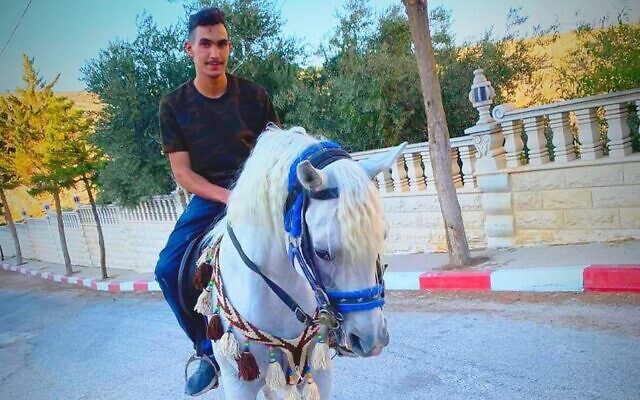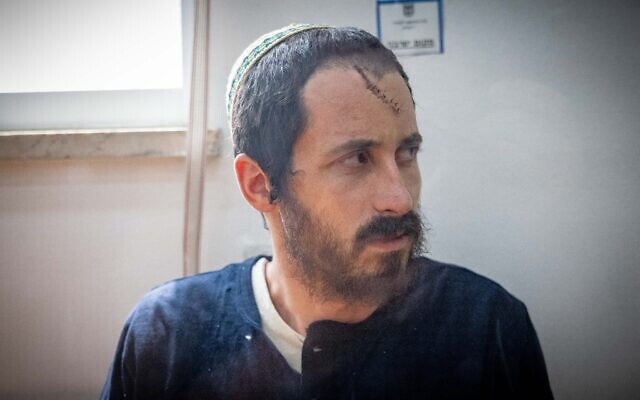The military imposed on Friday a six-month administrative restraining order barring Elisha Yered — one of two Israelis suspected of involvement in the fatal shooting of a Palestinian in the West Bank last month — from entering the territory.
IDF Central Command head Maj. Gen. Yehuda Fox said he was convinced that the “weighty security considerations require this and that it was necessary” to ensure the security of the West Bank.
According to the order, Yered won’t be able to enter the West Bank, including his home at the illegal outpost of Ramat Migron, and is also forbidden from contacting several far-right activists, including Yehuda Lieber, Rabbi Menachem Ben Shahar, Amitzur Ben Yosef, Oz Yehuda Rom and Ariel Danino.
Yered is suspected, along with Yehiel Indore, of being involved in the killing of 19-year-old Qusai Jamal Matan during a clash between Israeli settlers and Palestinians in the northern West Bank, just outside the town of Burqa, on August 4.
Yered, who until recently served as the spokesman for far-right coalition lawmaker Limor Son Har-Melech, was released to house arrest several days after the incident after a court found police did not have enough evidence to keep him in custody.
Get The Times of Israel's Daily Edition by email and never miss our top stories
The Honenu legal aid group, which is representing Yered, said such administrative orders are a “scandal” and called out the state’s so-called “belligerent and frenzied” acts.

Qusai Jamal Matan (Courtesy)
“We will continue to stand by the right of Elisha Yered and everyone who experiences these persecutions, and exhaust all legal procedures available to us in order to bring this simple and clear justice to light,” the group said.
Son Har-Melech said in a statement that the military order was an example of “persecution” against settlers and was an attempt by the IDF to cover up its failures against terrorism.
“I call on coalition members and particularly Defense Minister [Yoav] Gallant to act immediately to cancel the administrative order,” she added.
In a similar statement, Ben Shachar, a yeshiva teacher at the illegal West Bank outpost of Homesh said the military was trying to “defeat, through an unprecedented dictatorship, the protest we are leading against a failing security system.”
“This was a clear attempt at silencing that resembles the conduct of a dark regime. This is a legitimate and broad protest of normal residents who, in general, go out to shout in the street about lives that have been lost,” he said, claiming Fox was trying to cover up his failures fighting terror by silencing those who criticize him.
After being informed he would receive the order earlier this month, Yered condemned it as part of a “campaign of revenge.”
“The vindictiveness of the Jewish Department of the Shin Bet and the IDF head of the Central Command, following the collapse of the case they invented and inflated, breaks new records,” Yered claimed.
“After being severely criticized in all the courts, which ruled that there was no truth in the accusations against me, the Central Command and the Shin Bet decided to start a campaign of revenge,” he said.
Yered vowed the “draconian decree” would not deter him from being active in settlements or the media.
“The more you try to break us and fight us with more predatory means, the more we will continue our activities, and no order or harassment of one kind or another will break us,” he warned.
The case has garnered international media attention, partially due to the fact that Yered is a former spokesman for Son Har-Melech.
Indore is believed to be the person who shot Matan dead. Yered is suspected of involvement in the shooting and obstructing the investigation into the incident by taking the pistol that was used home with him.

Yehiel Indore, suspected of shooting and killing 19-year-old Palestinian Qusai Jamal Matan in the West Bank village of Burqa, arrives for a Jerusalem District Court hearing on August 14, 2023. (Chaim Goldberg/Flash90)
Indore was seriously injured in the incident, allegedly from a rock thrown by a Palestinian that hit his face, and spent some of his time in custody in a hospital before being transferred to a Prison Service medical facility.
During remand hearings, police representatives rejected Indore’s self-defense claim, saying the Burqa incident “did not start with the wounding of Indore and the killing of the Palestinian. It started a few hours before and ended after.”
Police claim that when the altercation between Palestinians and settlers first began, the latter did not immediately alert security forces but rather called for more settlers to come as backup. It was apparently only after the shooting that settlers notified the regional security headquarters.
Though police no longer suspect a racial motive for Indore’s actions, they do still suspect him of killing Matan with intent or indifference, participating in a riot, conspiracy to commit a crime, and obstruction of justice.


